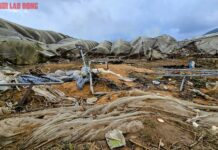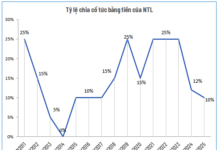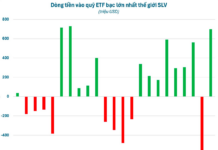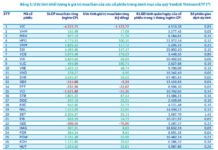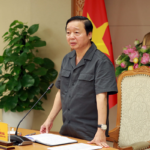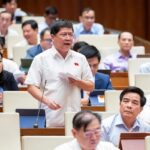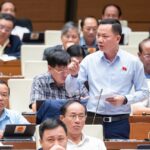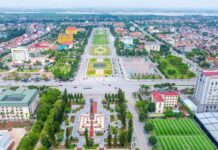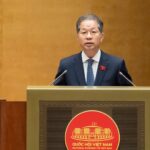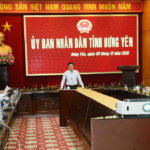“The real estate market is volatile, elusive, and difficult to price”
Deputy Pham Van Hoa of the Dong Thap Province Delegation stated that the Supervisory Delegation’s report was very specific and objective, with sufficient supporting data. The deputy noted that, prior to the COVID-19 pandemic, the real estate market had experienced robust growth in both quantity and quality. Numerous new urban areas emerged, particularly in Hanoi and Ho Chi Minh City, along with novel forms such as vacation apartments, resort villas, and office spaces combined with accommodations. High-rise apartment buildings sprang up, catering to diverse income levels, from luxury residences in the inner city to affordable housing in the suburbs. However, at present, land prices are soaring, and the demand for housing is not commensurate. Most purchases are made for speculative or rental purposes, with some buyers immediately reselling for a profit. As a result, the real estate market is volatile, elusive, and challenging to price accurately.
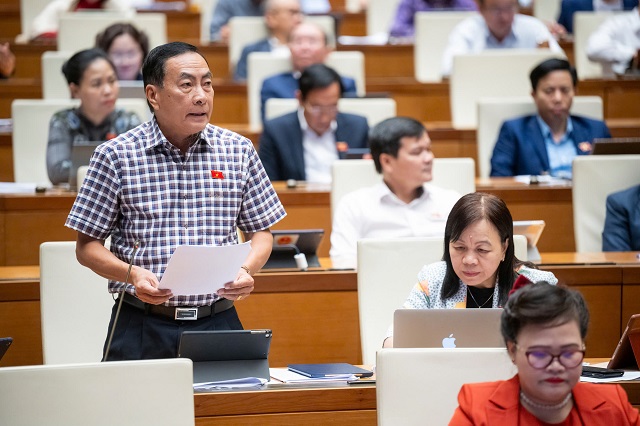 Deputy Pham Van Hoa of the Dong Thap Province Delegation delivers a speech at the meeting
|
According to the deputy, in the post-COVID-19 era, the real estate market has witnessed a significant downturn. Businesses that maintain high prices or are slow to sell are facing challenges as most rely heavily on credit. The real estate sector is nearly frozen, and even companies that reduce prices to two-thirds of the original are struggling to find buyers. This indicates that high-end housing is not in high demand among the general public. Conversely, there is a substantial need for affordable housing, yet it is not being constructed for sale.
The deputy attributed this situation to the government’s policies in areas such as finance, banking, and land laws, which do not sufficiently encourage investment in social housing. Additionally, a credit package of 120,000 billion VND has been slow to disburse, and many legal documents are overlapping and unclear. Several localities have not met the ratio of social housing as stipulated, and only a small number of apartments are available for purchase or rent, failing to meet the demand. Urban land is predominantly auctioned for commercial housing projects, while social housing relies on the 20% allocation within these commercial projects.
Furthermore, there are inconsistencies in the detailed guiding documents, which have undergone multiple revisions, leading to confusion in implementation. There is also a contradiction between urban planning and land use planning, and convenience in adjusting plans. The goal of constructing 1 million social housing units for the period 2021-2030 has not been adequately met, with some localities only beginning to implement it due to budgetary constraints. The majority of funding comes from socialization, and the construction of rental rooms is carried out by households and individuals. Investors face challenges in accessing land, and there are obstacles in transferring land use rights and changing land use purposes due to changing legal regulations. Delays in local land pricing are also contributing to the stagnation of real estate and social housing projects.
The deputy emphasized that the National Assembly’s supervision has identified strengths, weaknesses, and lessons learned in directing, organizing, and implementing the management of the real estate market and the development of social housing for low-income earners. Looking ahead, with the concerted efforts of the National Assembly, the Government, ministries, branches, localities, businesses, and citizens, the real estate market is expected to witness positive and favorable changes. Social housing will flourish, and many localities will embark on its development, ensuring that those in need of housing policies can access suitable accommodations, stabilize their lives, and pursue their careers. Real estate businesses will confidently invest in both commercial and social housing, stimulating consumption and propelling socio-economic development, ultimately stabilizing the lives of the people.
Speculation is the main reason for the high increase in land and housing prices
Regarding the surge in real estate prices in several major cities, Deputy Nguyen Thi Thuy of the Bac Kan Province Delegation stated that the recent significant increase in land and housing prices, particularly in Hanoi and Ho Chi Minh City, has introduced instability into the real estate market, which was just beginning to recover. Voters are concerned about price manipulation, market speculation, and misinformation.
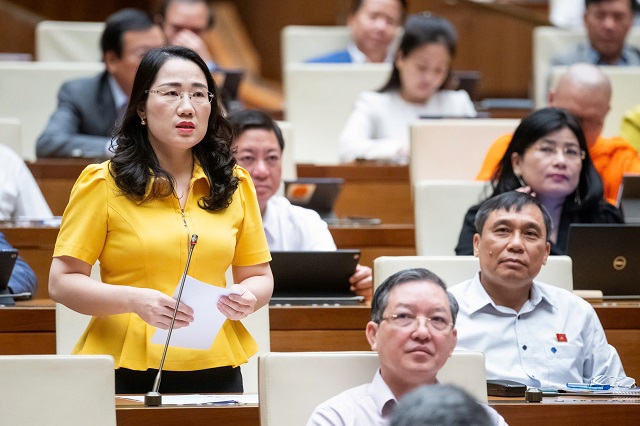
Deputy Nguyen Thi Thuy of the Bac Kan Province Delegation delivers a speech at the meeting
|
At a press conference on October 17, a leader of the Ministry of Construction stated that the recent sharp rise in land and housing prices was unreasonable and abnormal. Since the beginning of the year, real estate and land prices have continuously increased across all segments, from apartments to terraced houses and villas. This surge is not limited to central areas but has also spread to districts and suburban areas, with a particular focus on condominiums, where prices have doubled or even tripled compared to previous years.
Additionally, there is heated discussion about land auctions in some suburban districts, with prices reaching over 100 million VND per square meter, equivalent to the price of land in projects with completed infrastructure. This far exceeds the income of the majority of the population.
Deputy Nguyen Thi Thuy attributed this situation primarily to speculation and price manipulation by some investors, who aim to manipulate the psychology of the people for profit. She also pointed out that a portion of the population purchases land and housing with the intention of waiting for price increases, and this trend is on the rise. Furthermore, there is a severe shortage of affordable housing options for low-income earners.
Therefore, Deputy Nguyen Thi Thuy proposed that the Government continue to offer attractive incentives to encourage enterprises to develop commercial housing segments suitable for the budgets of most workers. She also requested that the Government resolutely address the bottlenecks in current housing projects and, if they fall under the authority of higher levels, report to the competent authorities for resolution. Additionally, she suggested that the Government research and implement robust measures to control speculation in the land and housing market.
There is a need to review the challenges in land pricing
Regarding land pricing, Deputy Nguyen Van An of the Thai Binh Province Delegation acknowledged the existence of numerous shortcomings, limitations, and challenges in this area, as outlined in the report. However, he noted that the solutions related to land pricing in the draft Resolution are rather general and lack specificity in addressing practical issues. Therefore, he emphasized the need to review and refine the solutions to make them more concrete and include clear timelines for implementation to effectively tackle the challenges.
Additionally, the draft Resolution includes a provision on not legitimizing violations to enhance the effectiveness of law building and enforcement. On this matter, the deputy recommended seeking the opinions of Government agencies and providing specific guidance on what constitutes the legitimization of violations. He highlighted that, in reality, localities would be confused about what exactly falls under this category.
The draft Resolution sets a target of constructing at least 1 million social housing units for low-income earners and industrial park workers during the period of 2021-2030, ensuring progress, quality, and suitability to the needs and living conditions of the beneficiaries. However, the deputy noted that this is merely a general policy and lacks specific orientations. He suggested that the draft Resolution should include additional tasks and solutions to prevent incorrect eligibility assessments and the resale of social housing units. He also emphasized the need to promote the construction of social housing funded by the state budget for rent in the coming years.
Approximately 800 social housing projects were implemented during the 2015-2023 period
The Local Real Estate Market: Where the Shortage Doesn’t Halt and the Surplus Doesn’t Sell.
“A thorough assessment of the local real estate markets is imperative to identify areas where there is a shortage of development and where there is an oversupply of properties that remain unsold.” This was one of the key messages conveyed by Deputy Prime Minister Tran Hong Ha during the Central Steering Committee meeting on housing policies and the real estate market, held on October 24th.
“Innovating Social Housing: Exploring Solutions for Individually-Built Rental Homes”
In the National Assembly session on October 28, alongside the proposal to reduce real estate prices through bonds, members of the National Assembly suggested that increasing the supply of social housing through encouraging individuals and households to build their own homes is a viable solution that warrants further research and consideration.
“Addressing the Soaring Property Prices: A Proposal to Tax Vacant Properties”
The Parliamentary Supervision Delegation recommends expediting the completion of research and proposing amendments and supplements to the tax laws. This includes the enactment of new legislation that introduces higher tax rates for individuals who occupy large land areas and own multiple residences, as well as for those who fail to utilize their land promptly or leave it abandoned.
“A Focused Approach: Targeting the Affordable Housing Market of $2.5 Billion and Below”
In the National Assembly session on October 28, a representative suggested that the government should focus on the affordable housing segment, specifically properties valued at 2.5 billion VND and below. This targeted approach would prevent the government from spreading its resources too thin. However, it is crucial to streamline the processes and avoid a bureaucratic maze when implementing social housing support policies.

